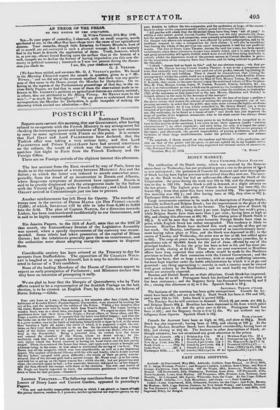LONDON THEATRES.—The following manifestafrom the new Great Lessee of Drury
Lane and Covent Garden, appeared in yesterday's Papers.
'The new and doubly responsible situation in which- I antadeeed, as lessee *beep Ebe,patent theatres, renders it. I presume, neither egotistical nor superertgatory on my part, *tinkly to inform the two companies, and the profession at large, of the course mean to adopt alibis unprecedentedly critical period of dramatic history. " AU patties will admit that the theatrical tunes have long been "Oat of joint." fit within a very recent period Covent Garden Theatre was not only prematui ely closet but the scenery, dresses. and properties, were actually advertised for sale; and althoue the theatre was afterwards reopened, it was effected by public sabaoriptiod, and by th creditors' consent to take a composition for their claims : it will also be recollect& that during the ahole of the previous ten years' management, it had but one profitabl. season. The fate or Drury Lane Theatre, during the said ten years, has been equate nnrortunate, since three successive lessees have totally failed, and it is only the wealt1 and great punctuality of Captain Polhill which have saved him from being similarly ii vulved; whilst the disastrous result of the present season at Covent Garden is prove. by the separation of the company from that theatre, and its being reduced to perform a the Olympic. " I admit "chance had no hand in this," and for one obvious reason.--viz, that pre tiously to Mr. Harris leaving Covent Garden Theatre, it was so far a prosperous eon cern, that annually very large sums were paid out of the profits. towards liquidating iii. debt caused by the new building. Then it should be remembered, that (during thi management) whilst the public could see a tragedy performed by John Kemble, Georm Cook, and Mrs. Siddons. mid afterwards by Miss O'Neil. Messrs. Young. Nlaeready. RR, C. Kemble, they could, in the same theatre, enjoy the combined talents ofIlliss Stephen, Miss M. Tree, Messrs. Liston. Jones, W. Farren, Fawcett, Emery, Ineledon, 8ce., Rio yet it is as extraordinary as true (which can be proved by the treasurer of each theatre) that the manager's weekly payments in salaries have (since the abolition, in Septembra 1829, of the maximum so long preserved by the late Messrs. Sheridan and Harris) in- creased, almost in the ratio to the decrease of the receipts I "It is therefore to provide, as far as practicable. for the loss of so large a portion ce the above talent, that makes the scheme of uniting the present companies one of ver■ pressing necessity, in order that the pnblic may once more witness the legitintate dram, properly represented ; fin it was wisely remarked by Mr. Henry Harris (on a recent occasion of petition to the Legislature against additional theatres), that, "Actors are not, like mechanics, to be found at a house of call :" and death has just deprived On- stage of another of its brightest ornaments, who in his short career was always Pound in, 1 ividually attractive. " However unpleasant, therefore, it may prove to my feelings to be compelled to re- turn to this system atlas maximum. I um sorry to say there appears (under "existing circumstances") no other expedient; and such being the case, it is hoped the odor- will take into consideration, first, that most professions have felt the severe pressure of the times; and afterwards. the proved impossibility of paying performers, and other branches of these large establishments, under the present expensive and. ruinom- regime.
To conclude, I throw myself on the caudour and liberality af the profession, and also on that of the public and the press, to aid and uphold me in my humble endea- vours to restore the prosperity of that long-neglected but rational source of amusemen. —the National Dratna.
















 Previous page
Previous page